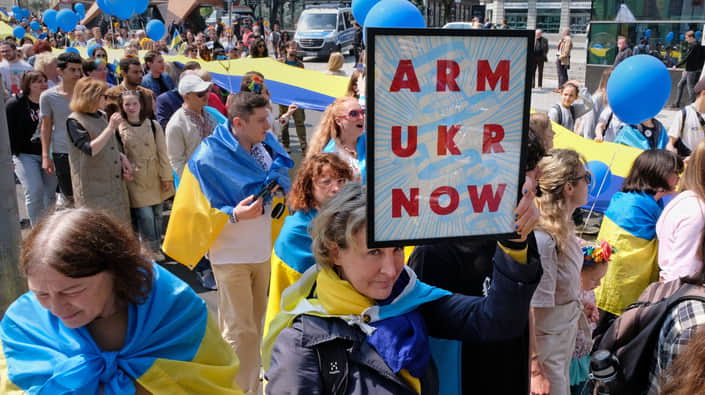Overhauling Western military support for Ukraine: imperative of EU plan for Ukraine's victory

The ongoing Russian war of aggression against Ukraine has not only become a critical test for the resilience of Ukrainian society but also a litmus test for the collective security architecture in Europe. However, despite concerted efforts, the current level of Western military support to Ukraine just allows Ukraine not to lose but falls far short of what is necessary for a decisive victory.
That is why there is an urgent need to radically reform the whole system of Western military support to Ukraine. Recently, in European Parliament I started to push an idea, that there should be the EU Plan for the Victory of Ukraine that argues for a comprehensive overhaul of the existing system to ensure Ukraine's success.
The cornerstone of my proposal to EPP Group's position paper is the establishment of a collective EU framework, aptly named "The EU Plan for the Victory of Ukraine," aimed at consolidating efforts and resources towards Ukraine's victory. The urgency of such a plan cannot be overstated, given the escalating situation on the frontline and the disproportionate military expenditures between Russia and its allies and the Western democratic world.
While the combined GDP of Western nations by 25 times dwarfs that of Russia, the disparity in military support provided to Ukraine is glaring.
In 2023 Russia managed to spend more than 100 billion euros on aggression, while combined Ukrainian expenditure (with all Western military support) reached only 80 billion euros.
The reason of such a situation is absolutely clear: in 2023, Western military aid to Ukraine amounted to a mere 0.1% of the combined GDP, whereas Russia allocated over 6% of its GDP towards military aggression.
These numbers speak to an unsatisfactory truth: until now, Western military support has enabled Ukraine not to lose the war but has been insufficient to achieve victory.
One of the critical shortcomings mentioned in the suggested EU Plan is the fragmented nature of the current military assistance, characterized by voluntary contributions from individual EU or NATO Member States.
This piecemeal approach not only lacks the collective political will necessary for sustained support to victory of Ukraine but also results in significant discrepancies in aid provision among different countries: Lithuania’s and Estonia’ support during two years of the war reached 1.2% of their GDP, Germany is catching up with 0.43%, but France is lagging behind with 0.02%.
The inadequacy of this system is further compounded by the depletion of conventional military stockpiles during the first two years of the war, necessitating a shift towards the production and delivery of new weaponry—a task that European military industries are struggling to fulfill.
The proposed EU Plan for the Victory of Ukraine seeks to address these deficiencies by instituting concrete measures to reform the whole military assistance system and move from individual to collective action and resource allocation. Key to its success is the establishment of EU-level obligations for long-term military support of Ukraine, surpassing the paltry 0.1% threshold set in previous years.
By committing to an annual support threshold of 0.25% of the Western combined GDP,
Western democracies can significantly, almost by 3 times enhance Ukraine's capacity to withstand Russian aggression and eventually secure victory.
Crucially, the EU Plan must extend beyond financial assistance to encompass a comprehensive array of military equipment and resources essential for Ukraine's defense.
From modern drones to air defense systems, the plan must prioritize strategic assets that afford Ukraine a decisive advantage over Russian forces. Furthermore, close collaboration with Ukrainian and NATO partners is imperative to accurately and timely assess Ukraine's evolving needs and tailor support, accordingly, including EU investment into modernization and development both of EU and Ukraine military industries.
However, the success of the EU Plan hinges on overcoming potential obstacles, including political inertia and strategic ambiguity.
It is essential to secure broad consensus among EU Member States and devise contingency plans, such as the hypothetical scenario where the United States Congress fails to approve necessary legislative packages or significantly diminish the level of the assistance to Ukraine.
Additionally, efforts to bolster Ukraine's indigenous military industry should be prioritized to reduce dependency on external aid and ensure long-term sustainability.
The Western delays and strategic ambiguity stimulate global autocracies to exert aggressive foreign policies, including the use of military means. The continuation of assistance is critically important not only for Ukraine, but also is in the most important strategic and national interests of the EU and NATO members states.
If not defeated, Russia will remain a permanent threat to European security.
The only way for sustainable peace on the European continent to be achieved is through the defeat of aggressive Russia in Ukraine and thus opening the window of opportunity for transformation of Russia into a normal, non-aggressive European country.
In order to defeat Russia, there is an urgent need to have EU Plan for the Victory of Ukraine. The Plan needs to bring a realistic hope to all of us that Russia will be defeated if not in 2024, then definitely in 2025-2026.
The road ahead may be fraught with challenges, but the imperative of securing Ukraine's victory transcends geopolitical calculations—it is a testament to the enduring spirit of freedom and democracy in Europe.
Publications in the Expert Opinion section are not editorial articles and solely reflect the author's point of view
